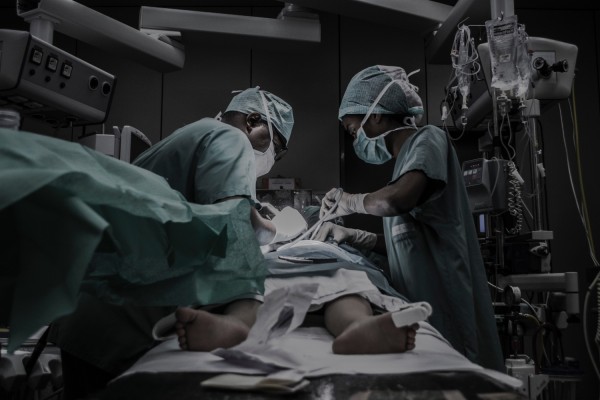Doctor-Turned-Patient: This Cleveland Clinic Physician Is a Massive Heart Attack Survivor

A few hours from his arrival at the hospital, Cleveland Clinic said a cardiac surgeon inserted a ‘temporary mechanical assist device’ for the Dr. Wilson’s heart's blood-pumping function.
No one thought that Fredrick Wilson, DO would ever suffer a massive heart attack, having been in an extraordinary physical condition.
Wilson's fitness from hard workouts, not to mention long-distance cycling, coupled with countless years of healthy eating, undoubtedly contributed to keeping this 64-year-old doctor alive, quite long enough for his fellow physicians at the Cleveland Clinic to revive and stabilize him before they did "a lifesaving heart transplant."
According to Michael Zhen-Yu Tong, MD, the cardiac surgeon who performed Dr. Wilson's transplant, the patient "took care of himself very well." The surgeon added, Wilson is not someone who, one would think, would suffer "a major heart attack."
The surgeon explained that the said attack impaired 75 percent of Wilson's heart, not "a heart attack one would normally survive."
ALSO READ: 5 Ways to Flush Out Caffeine When You've Had Too Much of It
The Day of the Heart Attack
Recent reports said, less than one week, following an exhausting 70-mile bike ride, left Wilson feeling more tired than the normal. He reportedly awakened at 3 a.m., incapable of catching his breath.
Sitting on the edge of his bed, the patient, according to reports, leaned forward to catch more air. He then stood up and walked slowly around the room but to no avail.
That, according to the doctor-turned-patient, is when he knew something really bad was happening. Possibly, in that particular occurrence, he said, he remembered thinking and asking himself, how could he be "having a heart attack?"
With what happened, Dr. Wilson woke his wife up, Deborah Ewing-Wilson, DO, who at that time knew, was aware that something as not right.
Deborah clearly understood the seriousness of the situation that she called 911 right away. Upon the paramedics' arrival, they administered oxygen, and quickly, they rushed the doctor to Cleveland Clinic Hillcrest Hospital.
And, because of restrictions resulting from the COVID-19 pandemic, Debora said she wouldn't be able to see her husband in person for weeks.
DON'T MISS THIS: Brain Scans of Children Hint Why Some Are Aggressive and Antisocial
Several Blood Vessels Blocked
Fast-acting physicians of critical care, as well as cardiologists, discovered that several blood vessels in Dr. Wilson's heart were blocked, some, his attending physicians said, "as much as 100 percent."
A few hours from his arrival at the hospital, Cleveland Clinic said a cardiac surgeon inserted a "temporary mechanical assist device" for the patient's heart's blood-pumping function.
This bought Wilson enough dime and stability to be transferred to the main campus of Cleveland Clinic, where it did not take long for doctors and staff to realize that their patient's heart was severely damaged to make him live longer.
Joining Dr. Tong were Steven Nissen, MD, and another cardiac surgeon, Aaron Weiss, MD, in identifying a suitable course of action.
ECMO Device
Dr. Tong shared that Dr. Weiss attempted another type of intervention by implanting "extracorporeal membrane oxygenation or ECMO device for additional cardiopulmonary support.
And since Wilson's kidneys and lungs were starting to fail, Dr. Tong said they needed "a very short window of opportunity" for intervention.
Ton said Wilson needed a heart transplant, and if they had not performed one in time, he added, he doesn't think their patient would have survived.
Realistically, the surgeon explained, despite the ECMO device, as well as the temporary mechanical device implanted, Wilson had less than two weeks.
Due to his life-threatening condition, Wilson met the qualifications of being the highest priority recipient of heart transplant under the guidelines of the United Network for Organ Sharing or UNOS.
The Good News
On June 23 this year, the Wilsons received the good news: finally, a healthy heart was available for the doctor. While the heart was on its way to the hospital, Dr. Tong started the surgery, timing Wilson's heart's removal with the heart's arrival.
With several surgeons, nurses, anesthesiologists, and specialists, the transplant got completed sans any major complication.
Slowly, the doctor recovered and started regaining some of the tens of pounds he had lost from the time of his heart attack.
Presently, about a month-and-a-half from the transplant, Dr. Wilson is back home, regaining his strength as he sleeps more than 10 hours each day.
After walking for several minutes, he knew he needed to rest. Fatigue, he shared, is what is he is currently working on to improve.
IN CASE YOU MISSED THIS: Why Stress Makes One Overeat or Not Eat at All, and How to Overcome It
Check out more news and information on Heart Diseases on MD News Daily.
Aug 27, 2020 07:40 AM EDT





